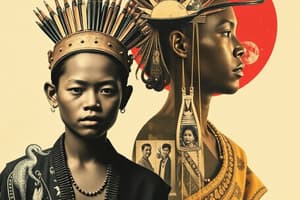Podcast
Questions and Answers
The Gaddang people traditionally planted tobacco and rice for their own use.
The Gaddang people traditionally planted tobacco and rice for their own use.
False (B)
Both male and female can conduct important rituals for the community among the Iwak people.
Both male and female can conduct important rituals for the community among the Iwak people.
False (B)
The Iwak people grow rice in the Cordillera highlands.
The Iwak people grow rice in the Cordillera highlands.
False (B)
The Gaddang people settle near mountains and their cultivated fields.
The Gaddang people settle near mountains and their cultivated fields.
The Iwak people rear animals, especially dogs, which play an essential role in their indigenous rituals.
The Iwak people rear animals, especially dogs, which play an essential role in their indigenous rituals.
The Gaddang people traditionally chose their community leaders based on their age, skills, knowledge of custom law, and a certain degree of earned wealth.
The Gaddang people traditionally chose their community leaders based on their age, skills, knowledge of custom law, and a certain degree of earned wealth.
The Iwak people plant taro and sweet potatoes in lower elevations.
The Iwak people plant taro and sweet potatoes in lower elevations.
An adult male must celebrate a padit, or personal prestige feast, at least twice in his lifetime among the Iwak people.
An adult male must celebrate a padit, or personal prestige feast, at least twice in his lifetime among the Iwak people.
The Gaddang people's agriculture cycle begins with the planting of the rice variety topeng in May.
The Gaddang people's agriculture cycle begins with the planting of the rice variety topeng in May.
Only male can conduct important rituals for the community among the Iwak people.
Only male can conduct important rituals for the community among the Iwak people.
Flashcards
Who are Igorot?
Who are Igorot?
Indigenous peoples in the Cordilleras, Northern Luzon, including Bontoc, Ibaloi, Ifugao, Isneg, Kalinga, Kankanaey, and Tingguian.
What is Tongtong?
What is Tongtong?
Discussion-settlement between parties, arbitrated with witnesses, for justice, unity, and peace in Cordillera tribes.
What is Kaihing?
What is Kaihing?
Early betrothal of children to strengthen relationships or settle disputes between families.
Gaddang leadership selection
Gaddang leadership selection
Signup and view all the flashcards
What is Pudon?
What is Pudon?
Signup and view all the flashcards
What is Padit?
What is Padit?
Signup and view all the flashcards
What are terraces?
What are terraces?
Signup and view all the flashcards
Gaddang's main crops?
Gaddang's main crops?
Signup and view all the flashcards
Applai's rich material culture
Applai's rich material culture
Signup and view all the flashcards
Study Notes
Indigenous Peoples in Northern Philippines
- The Igorot are the indigenous peoples in the Cordilleras in Northern Luzon, belonging to different ethnic groups such as Bontoc, Ibaloi, Ifugao, Isneg, Kalinga, Kankanaey, and Tingguian.
- The Gaddang, Ilongot, and Ivatan are found in the Cagayan Valley, Isabela, Nueva Vizcaya, and Quirino.
Traditional Practices
- Roots and tubers have always been considered staple food and vegetables among indigenous peoples in Northern Philippines.
- They uphold their traditions through their music, dances, rituals, folklore, wood carving, agriculture, and forestry practices.
- Many endemic trees, such as the Ficus Tree, are considered spirits (anito) and are conserved.
Conflict Resolution and Justice
- Customary laws lay the foundation for justice, unity, and peace within their tribes.
- Tongtong is a common practice in the Cordillera, referring to a discussion-settlement between different parties, in the presence of arbiters and witnesses.
- Kaihing is an early betrothal of children between two families to strengthen their good relationship or settle a dispute between two opposing families.
Material Culture
- The Applai have a rich material culture, as seen in their housing, including dormitory and granary structures, and four types of traditional houses, including the two-storey innagamang.
- They built sloping terraces for their agricultural work, and their agriculture cycle begins with the planting of the rice variety topeng in June or July.
Gaddang Traditions
- The Gaddang settled near streams and their cultivated fields, traditionally planting rice and sweet potatoes for their own use, and supplementing their subsistence with cash crops like tobacco and corn.
- They traditionally chose their community leaders based on bravery, skills, knowledge of custom law, and a certain degree of earned wealth.
- They crafted and enacted peace pacts, which they call pudon, and both male and female could conduct important rituals for the community.
Iwak Traditions
- The Iwak relies on agriculture as their primary source of subsistence, growing taro and sweet potatoes in the Cordillera highlands, and rice in lower elevations (like Nueva Vizcaya).
- They also rear animals, especially pigs, which play an essential role in their indigenous rituals, such as the padit, or personal prestige feast.
Studying That Suits You
Use AI to generate personalized quizzes and flashcards to suit your learning preferences.




